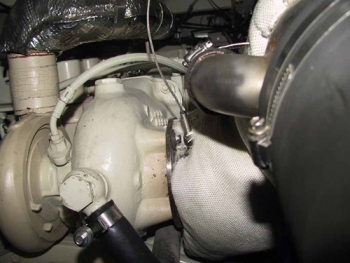MVDirona.com |
||
|
|
|
 |
|
Diesel Engine Overload: Diesel RPM Too Low?
James:
I read your
fine article about prop pitch and correct engine loading. I wonder whether you
have an answer to the following question. Before the question is presented, I
will state that I have a 1986 Albin 27 with a Nissan 6 in line that is rated at
78hp at 4000 rpm. Many
sources suggest running a marine diesel at about 90% of its rated load. I tend
to operate at about 2500 rpm, and while that is only one indication of load, is
this too slow an engine speed for normal operation?
Response: RPM isn't actually your only indication of load. There are actually are others and, in fact, RPM isn't really a good predictor of load. On electronic engines, you can just read the load percentage off of the instrument display. But those of us without electronic engines need a reasonably reliable proxy. Fuel consumption gives a very accurate estimation of the power being produced by an engine. Find the burn rate using Flow Scans or running for a substantial portion of a tank at the same load and then filling. Modern high speed diesels produce 18 to 20 hp per gallon burned per hour and this is a remarkably stable figure across all major brands. Older engines are on the low side of this and newer engines are on the high side. Once you know the HP you are producing, you can check the engine manufacturers curve on what the rated HP is at that engine speed to know percent of load.
There is considerable controversy over slow running. Some think that a diesel is happiest at high load and low load running will destroy them. My observation is hard running and overload destroys many engines. Many folks incorrectly think that reducing RPM and running "200 off the top" is enough to prevent overload. These engines live a tough live and die young. Engines that are lightly loaded last longer than overloaded engines. There is no question on that.
But what you are asking is "How slow can I run before I'm starting to be hard on the engines or negative impact their longevity?" In my view, the slower you run the engines the better as long as the following factors are true:
Light load can cause engines to run cold and this is damaging. Ensure you are at full operating temperature. If you are at full operating temperature, I believe that the lighter you can run, the longer they will last. This will bring some debate, but the commercial boats with very high hour engines are often the ones run at well below rated HP.
My engines spend many hours running at a fraction of full load in that we often cruise around at our hull speed of 7.5 kts. This only requires 30 HP from each engine where they are capable of 270 hp each. Our engines have never caused a problem in 2,900 hours and they will likely go for considerably longer.
If you are at full temperature, you can run them as slowly as you like. Light load is good as long as the engines is at full temperature.
-- James
Back to Diesel Engine Overload Introduction and Follow-up Questions
|
||
| Comments or questions? Feel free to contact us at Jennifer@mvdirona.com or jrh@mvdirona.com. |
Copyright 2012 Jennifer and James Hamilton |
|